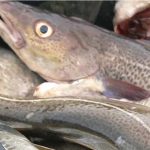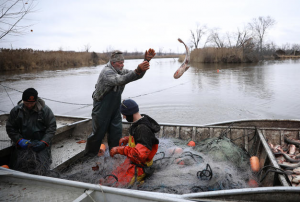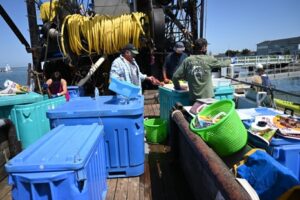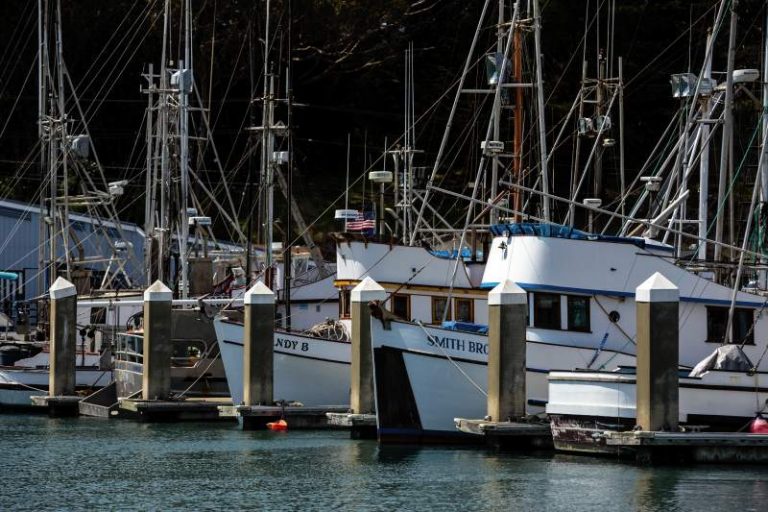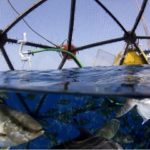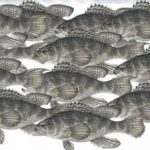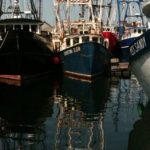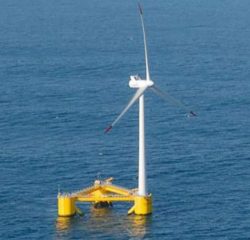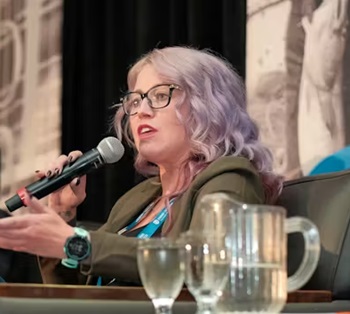 After two seasons of navigating turbulent waters, there is a sense of hope that the Newfoundland and Labrador fishery can finally sail into calmer conditions in April 2024. There was certainly no shortage of conflict on many fronts in 2024, despite efforts to get past some of the tensions that plagued the 2023 season. The provincial government had to step in and help resolve a tie-up by snow crab harvesters in the spring of 2023 that led to a six-week delay to the traditional start of the fishing season. The government formed a committee tasked with finding a better way to settle snow crab pricing, but even its recommendations failed to prevent another disagreement that led to another delayed start in April 2024. more, >>CLICK TO READ<< 09:01
After two seasons of navigating turbulent waters, there is a sense of hope that the Newfoundland and Labrador fishery can finally sail into calmer conditions in April 2024. There was certainly no shortage of conflict on many fronts in 2024, despite efforts to get past some of the tensions that plagued the 2023 season. The provincial government had to step in and help resolve a tie-up by snow crab harvesters in the spring of 2023 that led to a six-week delay to the traditional start of the fishing season. The government formed a committee tasked with finding a better way to settle snow crab pricing, but even its recommendations failed to prevent another disagreement that led to another delayed start in April 2024. more, >>CLICK TO READ<< 09:01
Tag Archives: DFO
More fish, for now: Offshore welcomes latest NL northern cod assessment, union questions DFO science
 The latest scientific assessment of northern cod is being touted as good news by companies with stakes in the offshore fishery but is being met with condemnation from the union representing inshore harvesters. The federal Department of Fisheries and Oceans (DFO) announced its findings during a Thursday, April 3, technical briefing. One year ago, DFO’s stock assessment moved northern cod out of what’s known as the critical zone — a level where serious harm is occurring to the stock — to the cautious zone, a designation in which the stock can sustain some fishing pressure. That led to the lifting of the moratorium on commercially fishing for northern cod — the stock of the species found in the waters off Newfoundland’s eastern coast and as far north as the southern shores of Labrador. Photos, more, >>CLICK TO READ<< 12:49
The latest scientific assessment of northern cod is being touted as good news by companies with stakes in the offshore fishery but is being met with condemnation from the union representing inshore harvesters. The federal Department of Fisheries and Oceans (DFO) announced its findings during a Thursday, April 3, technical briefing. One year ago, DFO’s stock assessment moved northern cod out of what’s known as the critical zone — a level where serious harm is occurring to the stock — to the cautious zone, a designation in which the stock can sustain some fishing pressure. That led to the lifting of the moratorium on commercially fishing for northern cod — the stock of the species found in the waters off Newfoundland’s eastern coast and as far north as the southern shores of Labrador. Photos, more, >>CLICK TO READ<< 12:49
DFO releases ‘optimistic’ northern cod stock assessment
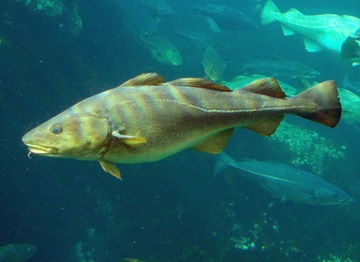 The latest northern cod stock assessment from the Department of Fisheries and Oceans is more optimistic than last year’s, according to scientists. The stock is currently about twice the limit reference point, and the department says there’s a greater than 99 per cent probability it’s still above the critical zone in Newfoundland and Labrador. The limit reference point marks the boundary between what’s considered critical and cautious. Cautious and healthy zones were not specified in the assessment’s release on Thursday because an upper stock reference has not been established yet. more, >>CLICK TO READ<< 16:03
The latest northern cod stock assessment from the Department of Fisheries and Oceans is more optimistic than last year’s, according to scientists. The stock is currently about twice the limit reference point, and the department says there’s a greater than 99 per cent probability it’s still above the critical zone in Newfoundland and Labrador. The limit reference point marks the boundary between what’s considered critical and cautious. Cautious and healthy zones were not specified in the assessment’s release on Thursday because an upper stock reference has not been established yet. more, >>CLICK TO READ<< 16:03
First Nations convoy targeting N.S. elver rivers to protest DFO as lawlessness returns to fishery
 A convoy of dozens of vehicles has been showing up at rivers along the Eastern and South shores, where its occupants have fished elvers en masse without licences. Commercial elver licence holders and sources within DFO have said the fishers originate from the Sipekne’katik First Nation. The convoy appears to be targeting rivers assigned to commercial licence holders, including the Fitzroy River in Hubbards, the Medway River near Liverpool and the Meteghan River in Southwest Nova Scotia. Stanley King of Atlantic Elver said that his fishers were met by a convoy of 40 vehicles when they showed up to fish the Fitzroy River on Sunday. more, >>CLICK TO READ<< 11:42
A convoy of dozens of vehicles has been showing up at rivers along the Eastern and South shores, where its occupants have fished elvers en masse without licences. Commercial elver licence holders and sources within DFO have said the fishers originate from the Sipekne’katik First Nation. The convoy appears to be targeting rivers assigned to commercial licence holders, including the Fitzroy River in Hubbards, the Medway River near Liverpool and the Meteghan River in Southwest Nova Scotia. Stanley King of Atlantic Elver said that his fishers were met by a convoy of 40 vehicles when they showed up to fish the Fitzroy River on Sunday. more, >>CLICK TO READ<< 11:42
Challenges facing elver fishers as season opens
 We’re nearly a week into elver season. The baby eel fishery on Maritime rivers has been plagued by shutdowns, poaching and illegal activity over the years. The federal Fisheries department decided to open the season last weekend, with several changes. A new app is now in place to track the catch, and a new quota plan gives more commercial catch to First Nations. Stanley King with Atlantic Elver Fishery Ltd. says some of his quota was taken without compensation. “First Nations now hold 53 percent of the fishery. We’re a shell of our former company, and other commercial license holders are feeling the same way. At this point, we’re trying to make ends meet,” said King. more, >>CLICK TO READ<< 11:02
We’re nearly a week into elver season. The baby eel fishery on Maritime rivers has been plagued by shutdowns, poaching and illegal activity over the years. The federal Fisheries department decided to open the season last weekend, with several changes. A new app is now in place to track the catch, and a new quota plan gives more commercial catch to First Nations. Stanley King with Atlantic Elver Fishery Ltd. says some of his quota was taken without compensation. “First Nations now hold 53 percent of the fishery. We’re a shell of our former company, and other commercial license holders are feeling the same way. At this point, we’re trying to make ends meet,” said King. more, >>CLICK TO READ<< 11:02
FFAW Demands Reassessment of DFO’s Snow Crab Quota Cuts Following Overnight Protest
 The FFAW says it has been told by the Department of Fisheries and Oceans that a reduction is coming for snow crab in the 3K zone. The union says it has been told that a 25 per cent reduction was coming for offshore harvesters and 20 per cent for inshore. The union said late Friday night that the move is “misaligned with the ecological realities of the region.” On Friday, some 200 harvesters rallied outside the DFO office in Grand Falls-Windsor to protest proposed cuts to the snow crab quota in area 3K. Meanwhile, the FFAW says their occupation of the DFO office in Grand Falls-Windsor overnight Friday was peaceful, despite not being invited into the office. Photos, links, more, >>CLICK TO READ<< 10:47
The FFAW says it has been told by the Department of Fisheries and Oceans that a reduction is coming for snow crab in the 3K zone. The union says it has been told that a 25 per cent reduction was coming for offshore harvesters and 20 per cent for inshore. The union said late Friday night that the move is “misaligned with the ecological realities of the region.” On Friday, some 200 harvesters rallied outside the DFO office in Grand Falls-Windsor to protest proposed cuts to the snow crab quota in area 3K. Meanwhile, the FFAW says their occupation of the DFO office in Grand Falls-Windsor overnight Friday was peaceful, despite not being invited into the office. Photos, links, more, >>CLICK TO READ<< 10:47
Fishing tug sinks at Howdenvale dock
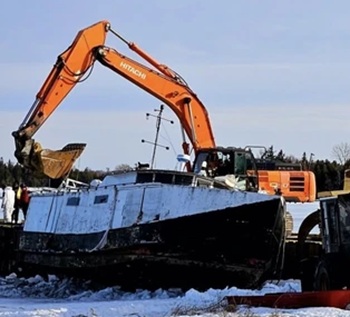 Another tugboat has sunk while tied up at a government dock on the Lake Huron side of the Bruce Peninsula, most recently earlier this month at Howdenvale. The Canadian Coast Guard said Friday in an emailed response to questions that it received a report on March 10 that “Keep the Change,” a 30-foot fishing tug, was sinking at the harbour and diesel was released into the water. The vessel owner and Chippewas of Nawash Fisheries Assessment Program staff deployed an absorbent boom and pads. The Coast Guard also deployed a containment boom around the vessel to limit the spread of pollution, the email said. more, >>CLICK TO READ<< 10:40
Another tugboat has sunk while tied up at a government dock on the Lake Huron side of the Bruce Peninsula, most recently earlier this month at Howdenvale. The Canadian Coast Guard said Friday in an emailed response to questions that it received a report on March 10 that “Keep the Change,” a 30-foot fishing tug, was sinking at the harbour and diesel was released into the water. The vessel owner and Chippewas of Nawash Fisheries Assessment Program staff deployed an absorbent boom and pads. The Coast Guard also deployed a containment boom around the vessel to limit the spread of pollution, the email said. more, >>CLICK TO READ<< 10:40
As the elver season opens, a First Nation is pushing back hard against DFO
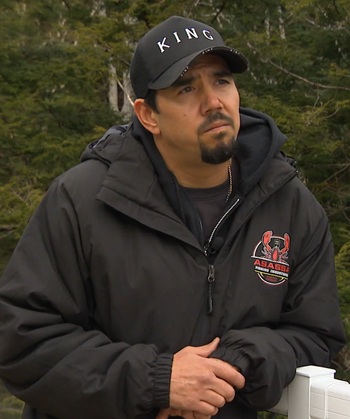 In the coming weeks, Matthew Cope will anchor his cone-shaped fyke net along a river, and as the overnight hours creep by and the ocean tide comes in, he will catch tiny but highly lucrative juvenile eels. He will do so, however, without authorization from the Department of Fisheries, asserting that as a Mi’kmaw harvester, he has a treaty right to fish for the young eels, known as elvers, even outside of federal regulations. He expects to be stopped, and even arrested by fisheries officers, as he was last year during an elver seizure at a transport facility in Dartmouth, N.S. Video, more, >>CLICK TO READ<< 06:40
In the coming weeks, Matthew Cope will anchor his cone-shaped fyke net along a river, and as the overnight hours creep by and the ocean tide comes in, he will catch tiny but highly lucrative juvenile eels. He will do so, however, without authorization from the Department of Fisheries, asserting that as a Mi’kmaw harvester, he has a treaty right to fish for the young eels, known as elvers, even outside of federal regulations. He expects to be stopped, and even arrested by fisheries officers, as he was last year during an elver seizure at a transport facility in Dartmouth, N.S. Video, more, >>CLICK TO READ<< 06:40
Fishermen frustrated after DFO extends gulf herring moratorium by 2 years
 Scientists say there are no signs that the Atlantic herring stock is improving, but some fishermen aren’t convinced. Fisheries and Oceans Canada placed a moratorium on herring fishing in the Gulf of St. Lawrence in 2022, saying urgent action had to be taken to give the stocks a chance to recover. Three years later, DFO said that recovery hasn’t happened, prompting the agency to keep the fishery closed through 2026. “The stock status is currently very much like it was the past few years,” said Jacob Burbank, a research scientist with DFO. “The stock is still in the critical zone, and it has been in the critical zone since the early 2000s.” Video, more, >>CLICK TO READ<< 06:42
Scientists say there are no signs that the Atlantic herring stock is improving, but some fishermen aren’t convinced. Fisheries and Oceans Canada placed a moratorium on herring fishing in the Gulf of St. Lawrence in 2022, saying urgent action had to be taken to give the stocks a chance to recover. Three years later, DFO said that recovery hasn’t happened, prompting the agency to keep the fishery closed through 2026. “The stock status is currently very much like it was the past few years,” said Jacob Burbank, a research scientist with DFO. “The stock is still in the critical zone, and it has been in the critical zone since the early 2000s.” Video, more, >>CLICK TO READ<< 06:42

A long time coming; Fish plant in Arnold’s Cove processes the first NL-caught northern cod since 1992 moratorium
There was no shortage of excitement at the fish plant in Arnold’s Cove on Thursday, Feb. 27, 2025, as the Icewater Seafoods processed its first offshore northern cod caught by Newfoundland and Labrador’s fleet since 1992. That was the year the commercial offshore fishery for northern cod came to a grinding halt under the moratorium imposed by the federal Department of Fisheries and Oceans (DFO). On Thursday, Capt. Peter Melvin and his 29-person crew from the Katsheshuk II, one of Ocean Choice International’s two offshore groundfish vessels, landed offshore Northern cod for the first time at the Icewater Seafoods plant. The crew was proud to be the first and we were encouraged by what we saw. The catch rates were good, we had clean catch with little to no bycatch and the fish were healthy. Photos, more, >>CLICK TO READ<< 16:45
Judge sides with DFO in elver quota dispute
 A judge has refused to overturn a decision made last year by a federal fisheries official to maintain the total annual quota for the Maritime juvenile eel fishery at 9,960 kilograms, a number that hasn’t budged for two decades. A group of commercial licence holders have argued there’s science that backs up their push to increase the total allowable catch, which they say would encourage more people who are fishing without authorization to enter the legal system. The case was in Federal Court earlier this month. In a Feb. 21 decision, Justice Richard Southcott sided with the federal government, ruling the reasons underpinning the quota decision were “comprehensible and rational.” more, >>CLICK TO READ<< 07:37
A judge has refused to overturn a decision made last year by a federal fisheries official to maintain the total annual quota for the Maritime juvenile eel fishery at 9,960 kilograms, a number that hasn’t budged for two decades. A group of commercial licence holders have argued there’s science that backs up their push to increase the total allowable catch, which they say would encourage more people who are fishing without authorization to enter the legal system. The case was in Federal Court earlier this month. In a Feb. 21 decision, Justice Richard Southcott sided with the federal government, ruling the reasons underpinning the quota decision were “comprehensible and rational.” more, >>CLICK TO READ<< 07:37
N.L. snow crab stocks remain healthy, but there is a threat to growth: DFO
 Newfoundland and Labrador snow crab stocks appear to remain healthy, Fisheries and Oceans Canada (DFO) said Tuesday during its annual stock assessment report. The latest assessment suggests the 2024 biomass of commercial-sized snow crab, which measure at a 95-millimeter shell width, remains near the same level as the year prior. Snow crab landings were recorded at over 56,000 tonnes in 2024. However, the assessment indicates poor stock growth over the next two to four years because of environmental conditions like warming oceans. Snow crab thrive in cold water with a narrow range of temperatures, and a warming climate can stunt production, growth and survival. It typically takes a male snow crab nine to 13 years to reach the legal commercial size. more, >>CLICK TO READ<< 16:56
Newfoundland and Labrador snow crab stocks appear to remain healthy, Fisheries and Oceans Canada (DFO) said Tuesday during its annual stock assessment report. The latest assessment suggests the 2024 biomass of commercial-sized snow crab, which measure at a 95-millimeter shell width, remains near the same level as the year prior. Snow crab landings were recorded at over 56,000 tonnes in 2024. However, the assessment indicates poor stock growth over the next two to four years because of environmental conditions like warming oceans. Snow crab thrive in cold water with a narrow range of temperatures, and a warming climate can stunt production, growth and survival. It typically takes a male snow crab nine to 13 years to reach the legal commercial size. more, >>CLICK TO READ<< 16:56
P.E.I. snow crab fishery faces deep cuts in catches as U.S. tariffs loom
 P.E.I. snow crab fishers are facing a big cut in how much they can catch in 2025, with the federal Department of Fisheries and Oceans recommending a 33 per cent reduction in their quota in the southern Gulf of St. Lawrence. That number is based on concerns about the health of the crab population and comes as the threat of a U.S. tariff looms over the industry. “It kind of hits you hard because it’s a substantial amount of crab to lose and it’s a substantial income to lose,” said Alden Gaudet, who fishes snow crab out of Tignish Run and is vice-president of the P.E.I. Snow Crab Association. “I believe we’ll be dropping about 20,000 pounds per licence this year, and I believe we dropped 21,000 pounds per P.E.I. licence last year,” Gaudet said. Photos, more, >>CLICK TO READ<< 17:05
P.E.I. snow crab fishers are facing a big cut in how much they can catch in 2025, with the federal Department of Fisheries and Oceans recommending a 33 per cent reduction in their quota in the southern Gulf of St. Lawrence. That number is based on concerns about the health of the crab population and comes as the threat of a U.S. tariff looms over the industry. “It kind of hits you hard because it’s a substantial amount of crab to lose and it’s a substantial income to lose,” said Alden Gaudet, who fishes snow crab out of Tignish Run and is vice-president of the P.E.I. Snow Crab Association. “I believe we’ll be dropping about 20,000 pounds per licence this year, and I believe we dropped 21,000 pounds per P.E.I. licence last year,” Gaudet said. Photos, more, >>CLICK TO READ<< 17:05
Large fishing boat overturns and leaks near Bella Bella; fishermen rescued
 A 58-foot fishing vessel, the Western Gambler, has run aground near Napier Point, about three kilometres south of Bella Bella. Early in the morning on Feb. 19, the Canadian Coast Guard (CCG) received a report that a craft was taking on water and tilting to one side. The Bella Bella lifeboat station crew responded quickly to help with the situation. “The CCGS Cape Farewell and our Bella Bella Fast Rescue Craft arrived on-scene and rescued the four fishermen onboard,” said the Canadian Coast Guard on behalf of the Unified Command group formed to respond to this incident The Unified Command group is a consortium of local and federal agencies including the CCG and DFO. No human injuries have been reported. more, >>CLICK TO READ<< 10:46
A 58-foot fishing vessel, the Western Gambler, has run aground near Napier Point, about three kilometres south of Bella Bella. Early in the morning on Feb. 19, the Canadian Coast Guard (CCG) received a report that a craft was taking on water and tilting to one side. The Bella Bella lifeboat station crew responded quickly to help with the situation. “The CCGS Cape Farewell and our Bella Bella Fast Rescue Craft arrived on-scene and rescued the four fishermen onboard,” said the Canadian Coast Guard on behalf of the Unified Command group formed to respond to this incident The Unified Command group is a consortium of local and federal agencies including the CCG and DFO. No human injuries have been reported. more, >>CLICK TO READ<< 10:46
Indigenous fishers, co-operatives are winners in Ottawa’s shuffle of baby eel quotas
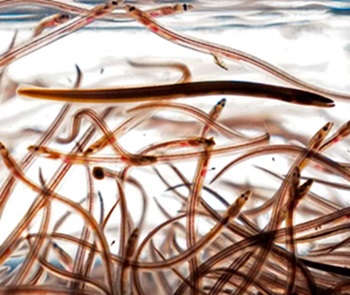 Ottawa has issued the latest version of how it is proposing to distribute licences for the lucrative baby eel fishery in the Maritimes. In a letter to stakeholders on Monday, the Fisheries Department says it is maintaining its plan to shift half the quota of close to 10,000 kilograms of elvers away from nine large licence holders to new entrants from Indigenous communities. However, Ottawa confirms it is backing away from a pilot project to redistribute 27 per cent of the catch of the nine licence holders to 120 fishers who used to work for them. That old pilot proposal, introduced in December, drew strong criticism from the potential recipients, who said they preferred to remain employees and felt safer on the rivers under the existing arrangement. more, >>CLICK TO READ<< 15:33
Ottawa has issued the latest version of how it is proposing to distribute licences for the lucrative baby eel fishery in the Maritimes. In a letter to stakeholders on Monday, the Fisheries Department says it is maintaining its plan to shift half the quota of close to 10,000 kilograms of elvers away from nine large licence holders to new entrants from Indigenous communities. However, Ottawa confirms it is backing away from a pilot project to redistribute 27 per cent of the catch of the nine licence holders to 120 fishers who used to work for them. That old pilot proposal, introduced in December, drew strong criticism from the potential recipients, who said they preferred to remain employees and felt safer on the rivers under the existing arrangement. more, >>CLICK TO READ<< 15:33
Increasing Jonah crab numbers a problem for lobster fishermen in parts of Nova Scotia
 A burgeoning Jonah crab population is proving a challenge for some Nova Scotia lobster fishermen. Dan Fleck, executive director of the Brazil Rock 33/34 Lobster Association, says the crabs are having a significant impact on the lobster catch in certain areas, particularly in lobster fishing area 34, which stretches from Yarmouth to the Bay of Fundy. He said fishermen in some areas are reporting a drop of 20 to 25 per cent in their lobster catches. Jonah crabs are a valuable bycatch in lobster fishing area 34 and can be kept for use as bait or for sale if they measure at least 130 millimetres, Fleck said. more, >>CLICK TO READ<< 07:14
A burgeoning Jonah crab population is proving a challenge for some Nova Scotia lobster fishermen. Dan Fleck, executive director of the Brazil Rock 33/34 Lobster Association, says the crabs are having a significant impact on the lobster catch in certain areas, particularly in lobster fishing area 34, which stretches from Yarmouth to the Bay of Fundy. He said fishermen in some areas are reporting a drop of 20 to 25 per cent in their lobster catches. Jonah crabs are a valuable bycatch in lobster fishing area 34 and can be kept for use as bait or for sale if they measure at least 130 millimetres, Fleck said. more, >>CLICK TO READ<< 07:14
Ottawa scraps elver fishery quota redistribution plan after backlash
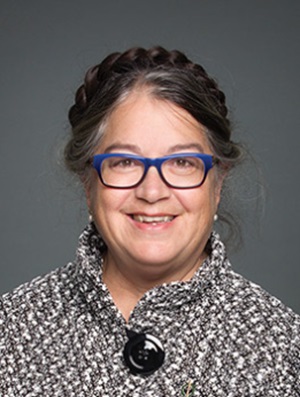 The federal government is no longer moving forward with its plan to redistribute the wealth of Nova Scotia’s baby eel harvest from large licence holders to individual fishers after receiving backlash from the industry. A statement from Fisheries Minister Diane Lebouthillier’s office said the minister reached the decision after listening to feedback from stakeholders in consultations held by the Department of Fisheries and Oceans (DFO) in recent weeks. A subsequent letter from the DFO in December to fishers detailing the planned redistribution said the nine commercial licensees that dominate the fishery would lose between 60 per cent and 90 per cent of their quotas, without compensation from the federal government. Video, more, >>CLICK TO READ<< 16:45
The federal government is no longer moving forward with its plan to redistribute the wealth of Nova Scotia’s baby eel harvest from large licence holders to individual fishers after receiving backlash from the industry. A statement from Fisheries Minister Diane Lebouthillier’s office said the minister reached the decision after listening to feedback from stakeholders in consultations held by the Department of Fisheries and Oceans (DFO) in recent weeks. A subsequent letter from the DFO in December to fishers detailing the planned redistribution said the nine commercial licensees that dominate the fishery would lose between 60 per cent and 90 per cent of their quotas, without compensation from the federal government. Video, more, >>CLICK TO READ<< 16:45
‘The only winner here is China.’ How DFO invested in and then killed Canadian eel aquaculture
 An aquaculture project that would have seen elvers grown to adulthood in Atlantic Canada rather than China has been thrown into disarray by DFO’s quota reallocation. Despite millions in investment, over a decade of research and the potential to increase profits for all involved ten-fold, federal Fisheries Minister Diane Lebouthillier won’t even respond to NovaEel’s letters. “The undermining of NovaEel means for the foreseeable future, or forever, there will be no domestic capacity to exploit our natural resource, and we will be 100 per cent beholden to foreign entities to realize value,” said Mitchell Feigenbaum, a commercial elver licence holder and investor in NovaEel. “Those entities are not going to invest in eel farms in North America and they have demonstrated the willingness and ability to support the trade of unlawfully caught eels without any hesitation.” more, >>CLICK TO READ<< 11:07
An aquaculture project that would have seen elvers grown to adulthood in Atlantic Canada rather than China has been thrown into disarray by DFO’s quota reallocation. Despite millions in investment, over a decade of research and the potential to increase profits for all involved ten-fold, federal Fisheries Minister Diane Lebouthillier won’t even respond to NovaEel’s letters. “The undermining of NovaEel means for the foreseeable future, or forever, there will be no domestic capacity to exploit our natural resource, and we will be 100 per cent beholden to foreign entities to realize value,” said Mitchell Feigenbaum, a commercial elver licence holder and investor in NovaEel. “Those entities are not going to invest in eel farms in North America and they have demonstrated the willingness and ability to support the trade of unlawfully caught eels without any hesitation.” more, >>CLICK TO READ<< 11:07
Notorious B.C. poacher who led authorities on boat chase found guilty of illegal sea cucumber harvest
 B.C.’s most notorious poacher has been found guilty again, this time of illegally harvesting and selling sea cucumbers, and breaching previous bans against owning a fishing vessel and fishing gear. Scott Stanley Matthew Steer was found guilty Wednesday of eight counts of contravening the federal Fisheries Act, based in part on information seized from his cellphone wallet that was tossed overboard after a boat chase in Vancouver harbour. Steer had already spent time in jail for illegally fishing, and had been slapped with a lifetime ban against fishing or even being on board a fishing vessel until 2038 — the first such ban in the Pacific region in over a decade. more, >>CICK TO READ<< 10:49
B.C.’s most notorious poacher has been found guilty again, this time of illegally harvesting and selling sea cucumbers, and breaching previous bans against owning a fishing vessel and fishing gear. Scott Stanley Matthew Steer was found guilty Wednesday of eight counts of contravening the federal Fisheries Act, based in part on information seized from his cellphone wallet that was tossed overboard after a boat chase in Vancouver harbour. Steer had already spent time in jail for illegally fishing, and had been slapped with a lifetime ban against fishing or even being on board a fishing vessel until 2038 — the first such ban in the Pacific region in over a decade. more, >>CICK TO READ<< 10:49
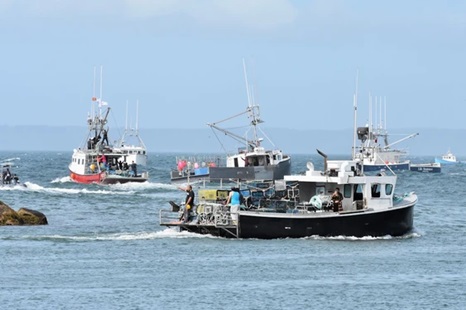
COMMENTARY: Bringing peace to Atlantic lobster fisheries, By Geoffrey V. Hurly
The ongoing controversy between Indigenous and non-Indigenous fishing interests is centred over equity in fishing rights. Indigenous groups claim that their treaty rights (signed in the 18th century) allow them to fish lobster (or any other species for that matter) anytime of the year, including outside the regulated fishing seasons imposed by Fisheries and Oceans Canada (DFO). Non-Indigenous harvesters argue that Indigenous people should not have the right to catch and sell lobsters at a time of year when commercial fishermen don’t. They worry about their own livelihood if lobsters are fished out of season during their moulting breeding time. more, >>CLICK TO READ<< 13:39
Is it 50 per cent of the fishery? What’s fair and what the feds won’t discuss on First Nations rights
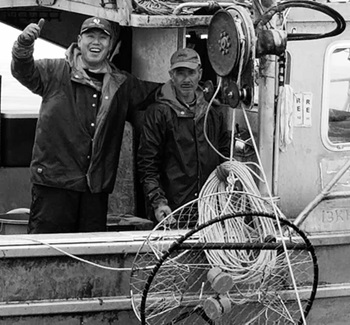 What’s fair? What’s a fair amount of Canada’s fisheries to transfer to First Nations to satisfy their moderate livelihood right? What’s fair to individual rights holders but, also, what’s fair to non-aboriginal communities whose cultures and incomes have relied upon fisheries for generations? Is it 50 per cent? That’s what Fisheries and Oceans Canada has gone with in two recent transfers of access to First Nations in Atlantic Canada and British Columbia that occurred without compensation to the commercial licence holders on the losing end. In 2021, Jason and the 33 other commercial fishermen in crab fishing area 24 were informed by DFO that the federal government was taking half the area’s 1,600 traps and giving them to the Five Nations. “It was definitely not fair,” said Voong, president of the BC Crab Fishermen’s Association, in a phone interview. more, >>CLICK TO READ<< 11:07
What’s fair? What’s a fair amount of Canada’s fisheries to transfer to First Nations to satisfy their moderate livelihood right? What’s fair to individual rights holders but, also, what’s fair to non-aboriginal communities whose cultures and incomes have relied upon fisheries for generations? Is it 50 per cent? That’s what Fisheries and Oceans Canada has gone with in two recent transfers of access to First Nations in Atlantic Canada and British Columbia that occurred without compensation to the commercial licence holders on the losing end. In 2021, Jason and the 33 other commercial fishermen in crab fishing area 24 were informed by DFO that the federal government was taking half the area’s 1,600 traps and giving them to the Five Nations. “It was definitely not fair,” said Voong, president of the BC Crab Fishermen’s Association, in a phone interview. more, >>CLICK TO READ<< 11:07
Industry withholding data on one of Canada’s largest fisheries, advocates say
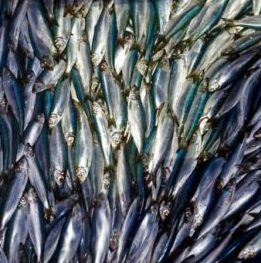 Advocates and scientists are raising concerns with the availability of data on one of Canada’s largest fisheries, as the Department of Fisheries and Oceans DFO is waiting on industry to provide data on the herring fishery in southwest Nova Scotia and the Bay of Fundy. For decades, herring stock has been declining and has been in the critical zone since 2018. In July, DFO reduced the total allowable catch to 16,000 tonnes per season, from 21,000, fixing the quota at the reduced level until 2027. Since then, advocates say the Herring Science Council — an industry body that, through an agreement with DFO, gathers the data that’s the only source of scientific information on the fishery — has not provided to the department the information it has collected. more, >>CLICK TO READ<< 08:12
Advocates and scientists are raising concerns with the availability of data on one of Canada’s largest fisheries, as the Department of Fisheries and Oceans DFO is waiting on industry to provide data on the herring fishery in southwest Nova Scotia and the Bay of Fundy. For decades, herring stock has been declining and has been in the critical zone since 2018. In July, DFO reduced the total allowable catch to 16,000 tonnes per season, from 21,000, fixing the quota at the reduced level until 2027. Since then, advocates say the Herring Science Council — an industry body that, through an agreement with DFO, gathers the data that’s the only source of scientific information on the fishery — has not provided to the department the information it has collected. more, >>CLICK TO READ<< 08:12
Elver prosecutions trickle into court after ‘hell’ year on N.S. and N.B. rivers
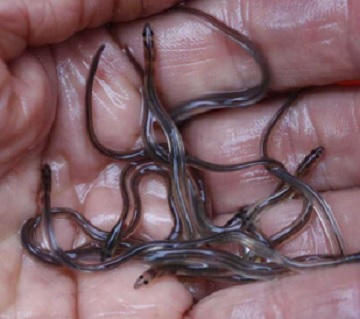 About three dozen people have been charged with offences related to this year’s chaotic illegal fishery for juvenile eels in the Maritimes, a number that falls well short of the overall tally of arrests this spring but which the federal Department of Fisheries and Oceans says could grow. The enforcement of the lucrative fishery for the tiny eels, also known as elvers, has been heavily scrutinized in recent years, with many in the industry outspoken about what they view as a failure to crack down on rampant poaching. The department said Friday that 37 people have been charged with elver-related fisheries offences committed in 2024, providing for the first time a concrete number of prosecutions that have emerged from a year when fisheries officers struggled badly to keep pace. more. >>CLICK TO READ<< 19: 03
About three dozen people have been charged with offences related to this year’s chaotic illegal fishery for juvenile eels in the Maritimes, a number that falls well short of the overall tally of arrests this spring but which the federal Department of Fisheries and Oceans says could grow. The enforcement of the lucrative fishery for the tiny eels, also known as elvers, has been heavily scrutinized in recent years, with many in the industry outspoken about what they view as a failure to crack down on rampant poaching. The department said Friday that 37 people have been charged with elver-related fisheries offences committed in 2024, providing for the first time a concrete number of prosecutions that have emerged from a year when fisheries officers struggled badly to keep pace. more. >>CLICK TO READ<< 19: 03
Ottawa has ‘carefully calculated plan’ to wreck eel business: lawsuit
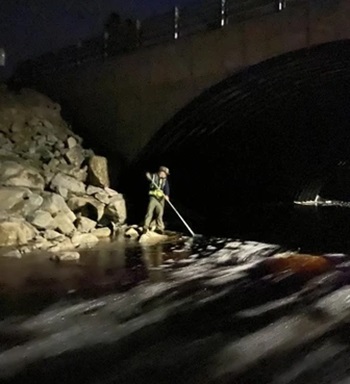 A New Brunswick entrepreneur whose family pioneered the baby eel industry in Canada is suing Ottawa again after it told her she would likely lose nearly 90 per cent of her business to First Nations and other people who want to get in on the lucrative fishery. In a filing in the Court of King’s Bench in Fredericton on Dec. 9, Mary Ann Holland accuses the defendants, who include three successive federal fisheries ministers and eight high-ranking officials in the Department of Fisheries and Oceans, or DFO, of having “engaged in a carefully calculated plan” over the years to drive her “out of business,” and give it away to First Nations and other fishers. “Such a plan represents patent gross abuse,” that they know will cause her companies, Brunswick Aquaculture and Alder Seafood, great damage, the lawsuit states. more, >>CLICK TO READ<< 14:56
A New Brunswick entrepreneur whose family pioneered the baby eel industry in Canada is suing Ottawa again after it told her she would likely lose nearly 90 per cent of her business to First Nations and other people who want to get in on the lucrative fishery. In a filing in the Court of King’s Bench in Fredericton on Dec. 9, Mary Ann Holland accuses the defendants, who include three successive federal fisheries ministers and eight high-ranking officials in the Department of Fisheries and Oceans, or DFO, of having “engaged in a carefully calculated plan” over the years to drive her “out of business,” and give it away to First Nations and other fishers. “Such a plan represents patent gross abuse,” that they know will cause her companies, Brunswick Aquaculture and Alder Seafood, great damage, the lawsuit states. more, >>CLICK TO READ<< 14:56
Nova Scotia against proposal to reallocate commercial elver quota
 “We just don’t agree,” Houston said about Ottawa’s proposal, which he called a shining example of the government’s “inability to properly understand and manage the fishery. It’s been communicated to them that we are not a fan of what they are trying to do there.” The elver fishery in the Maritimes has been tainted in recent years by drama and violence because of how profitable it is — the baby eels had reached market values as high as about $5,000 per kilogram in recent years. Under the proposed pilot allocation, the federal Fisheries Department is offering licences to 120 fishers currently employed by commercial licence holders, granting them 27 per cent of the overall quota. A further 1.5 per cent would be allocated to licences offered to 30 fishers who currently catch adult eels. more, >>CLICK TO READ<< 10:49
“We just don’t agree,” Houston said about Ottawa’s proposal, which he called a shining example of the government’s “inability to properly understand and manage the fishery. It’s been communicated to them that we are not a fan of what they are trying to do there.” The elver fishery in the Maritimes has been tainted in recent years by drama and violence because of how profitable it is — the baby eels had reached market values as high as about $5,000 per kilogram in recent years. Under the proposed pilot allocation, the federal Fisheries Department is offering licences to 120 fishers currently employed by commercial licence holders, granting them 27 per cent of the overall quota. A further 1.5 per cent would be allocated to licences offered to 30 fishers who currently catch adult eels. more, >>CLICK TO READ<< 10:49
Mik’maq elver fishers hope quotas create safety on N.S. rivers, but critics doubtful
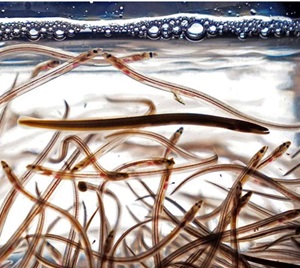 Indigenous elver fishers who once were at odds with federal fisheries officers say they’re hopeful that a new plan to provide them quotas this season will create more peace on the water. Earlier this month, a letter released by the federal Fisheries Department proposed a new quota system for the lucrative baby eel fishery that shifts 50 per cent of the total allowable catch of about 9,960 kilograms to First Nations fishers from commercial licence holders. Commercial elver fishers in the Maritimes have condemned the new system, saying it slashes their quotas without compensation, leaving little motivation for non-Indigenous companies to share their methods and facilities with the Indigenous entrants. more, >>CLICK TO READ<< 09:02
Indigenous elver fishers who once were at odds with federal fisheries officers say they’re hopeful that a new plan to provide them quotas this season will create more peace on the water. Earlier this month, a letter released by the federal Fisheries Department proposed a new quota system for the lucrative baby eel fishery that shifts 50 per cent of the total allowable catch of about 9,960 kilograms to First Nations fishers from commercial licence holders. Commercial elver fishers in the Maritimes have condemned the new system, saying it slashes their quotas without compensation, leaving little motivation for non-Indigenous companies to share their methods and facilities with the Indigenous entrants. more, >>CLICK TO READ<< 09:02
DFO to increase year-round lobster gear monitoring in Bay of Fundy
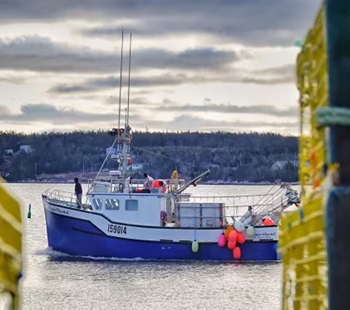 Enforcement officers with the federal Department of Fisheries and Oceans will soon have a new tool to lift, check and seize illegal lobster fishing gear from the waters between Nova Scotia and New Brunswick. The department is seeking a crew and vessel that would be contracted to take DFO officers on patrols to inspect fishing equipment. The patrol work isn’t new, but this contract represents an increase in surveillance and enforcement in an area where the fishing industry has called on officers to do more to deter illegal fishing operations. The contracted vessel would be responsible for patrolling throughout the Bay of Fundy and “be able to berth at various ports in New Brunswick and Nova Scotia,” according to the documents published online. more, >>CLICK TO READ<< 07:33
Enforcement officers with the federal Department of Fisheries and Oceans will soon have a new tool to lift, check and seize illegal lobster fishing gear from the waters between Nova Scotia and New Brunswick. The department is seeking a crew and vessel that would be contracted to take DFO officers on patrols to inspect fishing equipment. The patrol work isn’t new, but this contract represents an increase in surveillance and enforcement in an area where the fishing industry has called on officers to do more to deter illegal fishing operations. The contracted vessel would be responsible for patrolling throughout the Bay of Fundy and “be able to berth at various ports in New Brunswick and Nova Scotia,” according to the documents published online. more, >>CLICK TO READ<< 07:33
People who fish off P.E.I. have mixed reaction to new parental leave benefits
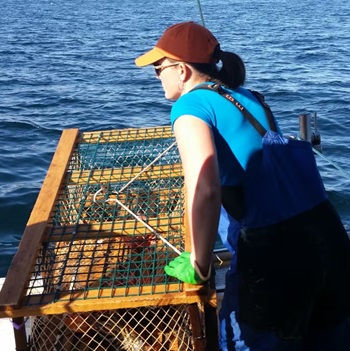 Some lobster fishing captains on Prince Edward Island say they think there will be little interest in new parental leave benefits just announced by the federal government. On Thursday, Ottawa announced maternity and parental benefits for people licensed to fish in Atlantic Canada, saying that could encourage the next generation of harvesters to join the fishing industry and provide more flexibility to those with new families. “I don’t think there’ll be a lot of uptake on it,” said lobster captain Charlie McGeoghegan, who fishes out of Pinette on P.E.I.’s south shore. “I haven’t heard anybody even ask for it, so I’m not sure where this came from.” Video, more, >>CLICK TO READ<< 07:26
Some lobster fishing captains on Prince Edward Island say they think there will be little interest in new parental leave benefits just announced by the federal government. On Thursday, Ottawa announced maternity and parental benefits for people licensed to fish in Atlantic Canada, saying that could encourage the next generation of harvesters to join the fishing industry and provide more flexibility to those with new families. “I don’t think there’ll be a lot of uptake on it,” said lobster captain Charlie McGeoghegan, who fishes out of Pinette on P.E.I.’s south shore. “I haven’t heard anybody even ask for it, so I’m not sure where this came from.” Video, more, >>CLICK TO READ<< 07:26






 Fisheries and Oceans Canada (DFO) is claiming that it has the authority to enforce fisheries laws on two Nova Scotia First Nations, and that it can and will send officers into First Nations to enforce its regulations. In a March 18 letter to Sipekne’katik Chief Michelle Glasgow, DFO’s Maritimes region director general Doug Wentzell refuted claims that a series of court rulings deprived his department of authority to manage First Nations fishers.“The courts have repeatedly upheld the Crown’s role in regulating the fishery, as well as the use of licensing as part of fisheries management, even when regulating the exercise of Aboriginal or Treaty rights,” reads Wentzell’s letter, obtained by The Chronicle Herald.
Fisheries and Oceans Canada (DFO) is claiming that it has the authority to enforce fisheries laws on two Nova Scotia First Nations, and that it can and will send officers into First Nations to enforce its regulations. In a March 18 letter to Sipekne’katik Chief Michelle Glasgow, DFO’s Maritimes region director general Doug Wentzell refuted claims that a series of court rulings deprived his department of authority to manage First Nations fishers.“The courts have repeatedly upheld the Crown’s role in regulating the fishery, as well as the use of licensing as part of fisheries management, even when regulating the exercise of Aboriginal or Treaty rights,” reads Wentzell’s letter, obtained by The Chronicle Herald.  Hurricane Fiona left a trail of destruction across the Atlantic Coast in September 2022 wreaking havoc on wharves, fisheries, vessels, and gear and the federal government’s pocketbook. In response to the climate disaster, Fisheries and Oceans Canada (DFO) has had to earmark more than $563 million to deal with Fiona’s aftermath, including damage to 142 out of 184 small craft harbours on the Atlantic coast. With a shrinking budget, the department is bracing for more severe financial and logistical challenges as the climate crisis intensifies. Yet the federal agency is already facing a yearly budget deficit of more than $100 million that hamstrings its ability to maintain its critical buildings, equipment, and other assets.
Hurricane Fiona left a trail of destruction across the Atlantic Coast in September 2022 wreaking havoc on wharves, fisheries, vessels, and gear and the federal government’s pocketbook. In response to the climate disaster, Fisheries and Oceans Canada (DFO) has had to earmark more than $563 million to deal with Fiona’s aftermath, including damage to 142 out of 184 small craft harbours on the Atlantic coast. With a shrinking budget, the department is bracing for more severe financial and logistical challenges as the climate crisis intensifies. Yet the federal agency is already facing a yearly budget deficit of more than $100 million that hamstrings its ability to maintain its critical buildings, equipment, and other assets. 



























